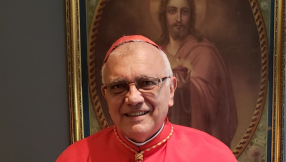There are many reasons to mourn Shimon Peres, who died today aged 93.
He was the last 'old guard' politician who formed a link with Israel's foundation in 1948. A protégé of David Ben-Gurion, Israel's first prime minister, Peres was a 'hawk' who became a 'dove' and spent most of his life working for a peaceful solution with the Palestinians.
Yes, he sharpened the Israeli Defence Force (IDF) and secretly amassed nuclear weapons during the 1960s. But, having softened, from 1977 he went on to lead the progressive Labour party for 15 years, and in 1994 shared the Nobel Peace Prize for his role in the Oslo accords the previous year, the closest Israel and Palestine have ever come to a lasting peace.
A giant of Israeli politics, though he never won an election outright, he served three times as prime minister, and as president from 2007 until 2014.
Pope Francis and Barack Obama are expected to attend Peres' funeral on Friday, and Obama has paid tribute to a man with whom all sides, including the Palestians, could work.
His death serves as a symbolic reminder of the elusive nature of a peaceful answer to what is probably the world's most intractable conflict.
With the right-wing prime minister Benjamin Netanyahu continuing to dominate the political scene, the prospects for peace seem as far away as ever.
For Netanyahu believes in preserving the status quo, where Peres had developed into an elder statesman who wanted to make a deal.
Even when the Labour veteran Peres left his party in 2006 to join Kadima, the new centrist party of Ariel Sharon, it was with a view to forging an agreement. Indeed, peace seems less likely now than it did when Sharon took the radical step of withdrawing Israeli settlements from Gaza more than 10 years ago, in 2005, before suffering a massive stroke and being left unable to complete his own journey from war-mongerer to an old man in a hurry to make peace. Peres differed from the right-wing Likud party of Netanyahu, most of whose Knesset members – including ministers – have just signed up for a settlement outpost which is illegal even under Israeli law.
Almost fifty years after the Six Day War, 2016 sees the election of a new US president, a key actor in any peace proposal. But any two-state solution would require a Palestinian state broadly along 1967 borders.
Donald Trump has effectively ruled that out with his promise to recognise Jerusalem as the undivided capital of Israel – a pledge to which Netanyahu will doubtless hold him if the Republican candidate wins in November. The problem of occupied East Jerusalem remains central to the conflict.
So currently, any hopes for progress must rest with Hillary Clinton. But Clinton herself has long showed every sign of being an uncompromising ally of Israel.
Clinton, who first visited Israel 35 years ago and has made many visits and "many friends" there since, has posted on her website a detailed account of her support for Israel, which she said after meeting Netanyahu this week she wanted to take "to the next level".
In the lengthy post, titled, 'Hillary Clinton and Israel: A 30-Year Record of Friendship, Leadership, and Strength', among many other commitments she talks of "deepen[ing] our unshakeable commitment to Israel's security" and opposing "anti-Israel bias" at the UN and in other bodies.
Indeed, several Israeli outlets have called Clinton the pro-Israel candidate, and earlier in the year the liberal daily paper Haaretz put it this way: "Of all of the presidential candidates, from both parties... Clinton had the longest public record of engagement with Israel, and has spent decades diligently defending the Jewish state."
Controversially, she blamed the 2014 Gaza war on Hamas. "I have said publicly – and I believe it – that Hamas provoked Israel in order to actually cause what we are now seeing," she told CNN.
And as the conservative Christian commentator Peter Hitchens observed from America at the weekend, Clinton, who, let it not be forgotten, backed the 2003 invasion of Iraq, is more likely to drag us into wars, than to usher in peace agreements.
The likelihood anyway is surely that Clinton would "park" the issue of a Palestinian state in favour of more pressing concerns in the Middle East, such as Syria, and indeed Iraq.
But even if this is not the case, and Clinton seeks to pick up where her husband tried and failed with Oslo, there is no evidence that Israel will listen to repeated US demands for withdrawing settlements in the West Bank, another key obstacle to peace.
It is sometimes said that the Palestinians never miss an opportunity to miss an opportunity, never more so than under President Arafat over Oslo. Yet the Israelis under Netanyahu appear deliberately to dodge any chance at peace. Obama, who began his presidency with an eloquent speech to the Muslim world from Cairo, by all accounts sought peace in Israel and Palestine as a key legacy of his presidency. Yet Natanyahu repeatedly denied him progress, as is testified by their soured relations.
Now all eyes are on who will succeed Obama. Neither scenario bodes well for the Palestinians, nor for Israel itself which, contrary to conventional wisdom, would benefit hugely from a peace deal.
Indeed it is in the interests of all sides, including the US and the wider world, for peace to come to Israel and Palestine. Yet any predictions of progress at this stage are, sadly, a triumph of hope over experience.













